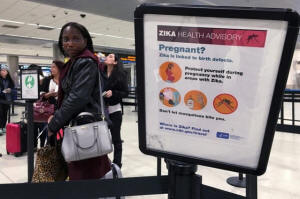|
Miami hotel bookings slow, airfares fall
since Zika outbreak
 Send a link to a friend
Send a link to a friend
 [August 27, 2016]
By Jeffrey Dastin [August 27, 2016]
By Jeffrey Dastin
(Reuters) - Travelers have booked fewer
hotel rooms in downtown Miami, and leisure airfares to the greater Miami
area have inched down in the weeks since the Zika virus was detected
there, data reviewed by Reuters shows.
Hotels sold 2.9 percent fewer rooms in Miami's central business district
and northern neighborhoods during the first three weeks of August than
they did a year earlier in the same period, according to hotel data and
analytics firm STR.
That area includes the Wynwood arts district where on July 29 Florida
officials said they confirmed cases of people who contracted the virus,
marking the first transmissions by mosquitoes in the continental United
States.
The decline in hotel bookings may be an early indication of the virus's
effect on Miami's robust tourism industry, which had an economic impact
of $24.4 billion in 2015, according to the Greater Miami Convention and
Visitor Bureau.
The drop in the number of hotel room sales for the downtown and north
Miami areas is a departure from largely uninterrupted growth in bookings
there at least since 2010. From January 2016 through July, hotel stays
by paying travelers were up 1.2 percent from a year ago, according to
STR data.
But for the latest week ended Aug. 20, the number of hotel rooms sold
was down 4.2 percent, compared to a year earlier.

Jan Freitag, senior vice president of lodging insights at STR, said the
decline was not due to abnormally strong numbers the year before, and
could reflect the impact of Zika virus concerns.
"We don't know enough yet," Freitag told Reuters, saying he would like
to see up to two months of data, and monitor traffic to Miami from
Europe and Brazil, both major sources of visitors to South Florida.
"Zika is not only a serious threat to public health. It has the
potential to be an equally serious threat to a community’s economy,"
said travel industry analyst Henry Harteveldt, adding that worries about
the virus likely contributed to the decline in Miami.
AIRFARES DOWN
The Zika virus was detected in Brazil last year and has since spread
across the Americas. The virus poses a risk to pregnant women because it
can cause a severe birth defect known as microcephaly. In Brazil, more
than 1,800 cases of the condition have been linked to Zika.
Earlier this week, officials reported new Zika infections in Wynwood,
and also one case hundreds of miles away in Pinellas County, on the Gulf
Coast.
The U.S. Centers for Disease Control and Prevention said that pregnant
women who are worried about exposure to Zika might consider avoiding all
of Miami-Dade County. On Friday, the U.S. Food and Drug Administration
recommended universal testing of donated blood for the virus in the
United States and its territories.
Miami tourism officials said hotel managers have not alerted them to
bookings weakness related to the Zika virus.
It was too early to tell from the data that Zika had an impact on travel
or bookings, tourism officials said.
[to top of second column] |

A woman looks at a Center for Disease Control (CDC) health advisory
sign about the dangers of the Zika virus as she lines up for a
security screening at Miami International Airport in Miami, Florida,
U.S., May 23, 2016. REUTERS/Carlo Allegri

"These numbers don't turn this quickly," said William Talbert, chief
executive of the Greater Miami Convention and Visitors Bureau.
In a sign that airlines are trying to stimulate demand to and from
Miami, airfares have gotten cheaper from a year ago, according to an
analysis of the top U.S. domestic routes by Harrell Associates that
was reviewed by Reuters.
Leisure fares on Miami routes were down 9 percent in late July from
the prior year, while those to Fort Lauderdale were down 14 percent,
the Harrell Associates data shows. Fares were sampled July 18 and
July 25.
Since the first Zika cases were announced, the decline in leisure
fares to and from Miami had widened to 16 percent, while fares for
nearby Fort Lauderdale had dropped an average of 18 percent from a
year earlier, the analysis found. That data is based on samples of
airfares taken Aug. 15 and 22.
Nationwide, the high-restriction leisure fares are down 3 percent in
mid-August from the prior year, the analysis by Harrell Associates
found.
American Airlines Group Inc <AAL.O>, the largest carrier in Miami,
declined to comment on individual markets or whether the virus would
impact its business. Its rival in the area, JetBlue Airways Corp
<JBLU.O>, did not immediately comment.
Airlines have been struggling for months to curb the decline of
ticket prices amid growing competition in popular markets.
While Miami Beach has continued to see hotel demand rise through
August, that rate has appeared to slow: from 6.4 percent higher in
the first seven months of the year compared to the same period in
2015, to only 2.6 percent higher this month, the STR data showed.
The same trend holds true for Miami-Dade and Monroe counties,
according to the data.
Miami Beach has about 2.5 times the number of hotels as downtown and
north Miami, STR said.
(Reporting By Jeffrey Dastin in New York; Editing by Bernard Orr)
[© 2016 Thomson Reuters. All rights
reserved.]
Copyright 2016 Reuters. All rights reserved. This material may not be published,
broadcast, rewritten or redistributed.
 |